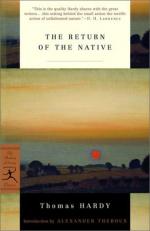|
|
Return of the Native Topic Tracking: Natives' Attitude Toward Heath
Natives' Attitude Toward Heath 1: The heath is comfortable for those who live there. The inhabitants of the heath are accustomed to its forbidding, wild landscape.
Natives' Attitude Toward Heath 2: The Yeobrights are content living on the heath. Captain Vye tells Eustacia that she might find them to be too "countrified," for they enjoy what the heath offers.
Natives' Attitude Toward Heath 3: Clym, having been born and raised on the heath, loves Egdon. He is a "product" of the heath--he understands and appreciates it for what it is. Clym is accustomed to the country ways and customs of the heath and would rather live simply than live in a flashy, glamorous environment like Paris. He is glad to return, to Eustacia's surprise.
Natives' Attitude Toward Heath 4: Clym wants to make a significant contribution to the home and the people he loves rather than work and make a large fortune. He is as passionate about staying on the heath and giving back to the land as Eustacia is desperate to leave Egdon.
Natives' Attitude Toward Heath 5: Although Mrs. Yeobright is comfortable living on the heath, she wishes that Clym would return to his flourishing diamond trade occupation. She feels that the heath is degrading for Clym, but he does not view it that way.
Natives' Attitude Toward Heath 6: Eustacia is shocked when Clym tells her that the heath soothes and inspires him. She cannot imagine how anyone can think the heath has a positive influence on them. Also, Eustacia is floored when Clym remarks that he would not like to live anywhere else but Egdon.
Natives' Attitude Toward Heath 7: Eustacia is greatly shamed by Clym's furze-cutting job. Although Clym views the job as an occupation that makes him feel useful and earns him money, Eustacia feels that the job is the lowest form of degradation and humiliation possible. She cannot deny her hatred for the heath when Clym asks if she regrets marrying him, now that he is a furze-cutter.
Natives' Attitude Toward Heath 8: The heath landscape helps Venn in thwarting Wildeve. Venn rigs a trap for Wildeve, using two tufts of grass. The dark bushes and furze also camouflage him from Wildeve's sight. Venn, a native of the heath, knows it as well as Clym does and the heath rewards him.
Natives' Attitude Toward Heath 9: Wildeve is surprised to hear that Thomasin is comfortable living on the heath. While he has made it known that he greatly dislikes the heath, Thomasin tells him that she is used to the heath and does not mind its isolated, wild. She, like Clym and Venn, is a product of the heath and can live on it with satisfaction and pleasure.
Natives' Attitude Toward Heath 10: To Thomasin, the heath on a dark, stormy night is not malicious or disturbing--it is simply land and bad weather that might lead to a cold. She does not believe the land to be against her, as does Eustacia.
Natives' Attitude Toward Heath 11: Venn knows the heath so well that he is not distracted by high winds or heavy rains. Venn understands and accepts the heath as much as Clym does.
Natives' Attitude Toward Heath 12: Thomasin uses the heath, taking her baby out on it to practice walking. The grass and turf provide a soft cushion for the baby to walk on and fall against. Thomasin's acceptance of the land is in accordance to her matter-of-fact manner about the heath: the heath is a comfortable place where she can raise her child, but it is also a place where she might fall ill.
Natives' Attitude Toward Heath 13: Clym uses the summit of Rainbarrow to serve as his pulpit when he preaches. The barrow is his agent for reaching out to the heath-folk; at all points of the heath, the villagers can see and hear him.




